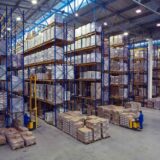The Impact of Blockchain on LogixAcross: How Distributed Ledger Technology is Transforming LogixAcross Logistics
April 25, 2022 0Industry Trends & Market InsightsTechnology & Innovation in Logistics
The logistics industry is on the cusp of a revolution, driven by the increasing adoption of blockchain technology. At LogixAcross, we’re at the forefront of this transformation, leveraging blockchain to improve supply chain visibility, reduce costs, and enhance the customer experience.
In this article, we’ll explore the impact of blockchain on LogixAcross, and how distributed ledger technology is transforming our logistics operations.
What is Blockchain?
Blockchain is a distributed ledger technology that enables secure, transparent, and tamper-proof transactions. It’s the underlying technology behind cryptocurrencies like Bitcoin and Ethereum, but its applications extend far beyond digital currency.
How is LogixAcross Using Blockchain?
At LogixAcross, we’re using blockchain to transform our logistics operations in several ways:
– Supply chain visibility: We’re using blockchain to provide real-time visibility into the supply chain, enabling our customers to track their shipments from origin to destination.
– Freight auditing and payment: We’re using blockchain to automate freight auditing and payment processes, reducing errors and improving efficiency.
– Customs clearance: We’re using blockchain to automate customs clearance processes, reducing delays and improving efficiency.
The Benefits of Blockchain in Logistics
The benefits of blockchain in logistics are numerous, including:
– Improved supply chain visibility: Blockchain provides real-time visibility into the supply chain, enabling logistics companies to track shipments and manage inventory more effectively.
– Increased efficiency: Blockchain automates many processes, including freight auditing and payment, and customs clearance, enabling logistics companies to reduce errors and improve efficiency.
– Enhanced security: Blockchain provides a secure and tamper-proof record of transactions, enabling logistics companies to reduce the risk of fraud and cyber attacks.
Case Studies: Real-World Examples of Blockchain in Logistics
Here are a few examples of how LogixAcross is using blockchain to transform our logistics operations:
– Real-time tracking: We’re using blockchain to provide real-time tracking of shipments, enabling our customers to track their goods from origin to destination.
– Automated customs clearance: We’re using blockchain to automate customs clearance processes, reducing delays and improving efficiency.
– Improved supply chain visibility: We’re using blockchain to provide real-time visibility into the supply chain, enabling our customers to track their shipments and manage inventory more effectively.
The Future of Blockchain in Logistics
As blockchain technology continues to evolve and improve, we can expect to see even more innovative applications in the logistics industry. Some potential future developments include:
– Increased adoption: Blockchain will become more widely adopted in the logistics industry, enabling companies to improve supply chain visibility, reduce costs, and enhance the customer experience.
– More sophisticated applications: Blockchain will be used to develop more sophisticated applications, such as predictive analytics and machine learning, enabling logistics companies to optimize their operations and improve efficiency.
– Greater collaboration: Blockchain will enable greater collaboration between logistics companies, enabling them to share data and best practices, and improve the overall efficiency of the supply chain.
Conclusion
Blockchain is transforming the logistics industry, and LogixAcross is at the forefront of this transformation. By leveraging blockchain to improve supply chain visibility, reduce costs, and enhance the customer experience, we’re able to provide our customers with a more efficient, secure, and transparent logistics experience. As blockchain technology continues to evolve and improve, we can expect to see even more innovative applications in the logistics industry.











